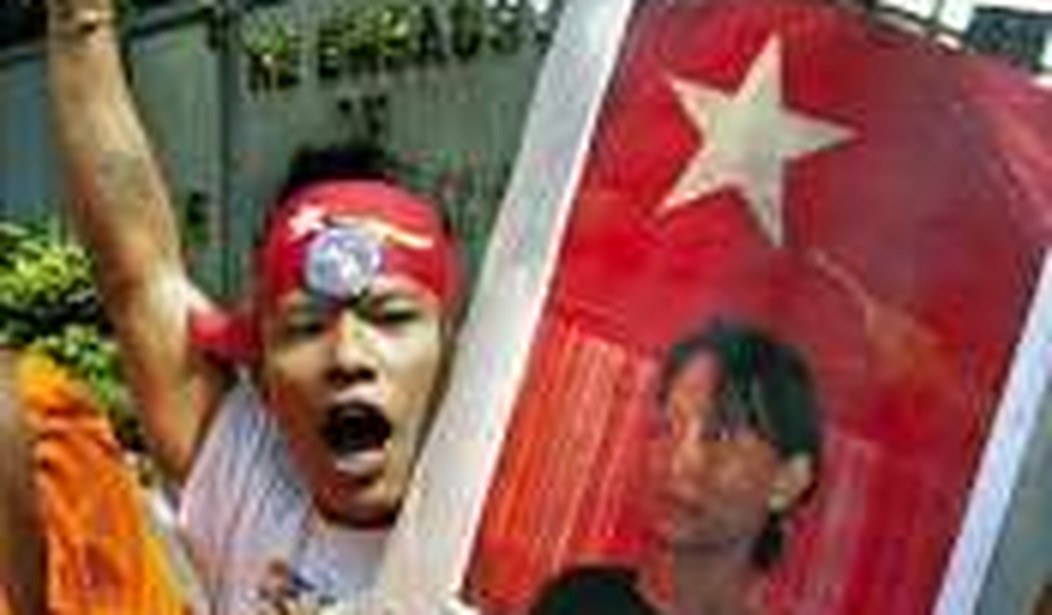The brutal crackdown is underway and the brave souls who played a part in the resistance in Burma are now paying for their courage with beatings, interrogation and torture.
Many in the West will go back to their rhetoric, denouncing the Burmese military junta, making statements and asking the generals for a peaceful transition to democracy. The media and political elite will doubtlessly rush forward again, blaming the generals and asking for more sanctions. But who dares dig deep down, face the truth and ask: why did the uprising fail?
The current uprising has revealed an ugly truth: there is a near total disconnect between people inside Burma and activists’ movements outside the country. They are two disjointed parallel worlds. Inside Burma, people are struggling to face the brutal suppression without much help, while outside most of the exile leaders are focusing on lobbying and public relations.
The most hurtful consequence of this duality was that when the uprising was gaining momentum and young leaders were begging for help on strategy asking what the next move, they were left rudderless. When young leaders were begging for guidance from the experienced leaders of previous uprisings, there were very few who bothered to return their calls. Why? Many were too busy competing for airtime on talkshows to respond to these cries for help from the inside.
Burmese military leaders have systematically crushed the opposition internally. The exiled leaders still have no clue of what is needed to face these military dictators. The result is that there is no political infrastructure to mobilize the masses, and, most importantly, there is a total generation gap in the leadership.
Nor is the problem confined to the Burmese opposition. Western democracies are totally focused on bringing the generals to the negotiation table with Daw Aung Suu Kyi (DASSK) by imposing sanctions on the Burmese government — a strategy they have pursued without success for the last 18 years.
It may have been feasible in early 1990s when the military junta was emerging from a total government breakdown following the earlier national uprising and their foreign reserves were down to less than 30 millions dollars. They were vulnerable then. But the street-smart generals soon addressed their weaknesses: they made peace with drug lords and survived on profits made from money laundering. Then the SPDC, the State Peace and Development Council, which is the official name for the military junta — systematically implemented a triangulation foreign policy of building a relationship with China, ASEAN and India to neutralize Western sanctions. The Burmese generals understood full well that Burma sat between ASEAN and South Indian nations and played the geopolitical card. Worse yet, they found gas; now the generals have even befriended the Russians and Koreans in addition to their Thai, Chinese, Indians and the French pals by using the global energy shortage to their advantage. Thus strengthened, the canny generals can not only secure the Russian and Chinese vetoes at the United National Security Council to cover their brutality, they could even neutralize the South African vote.
While the generals were working hard, and going from strength to strength, the exile leaders led by NCGUB –the government-in-exile– were squandering their opportunities. They spent nearly two decades begging for funds, yet failed to build the necessary political infrastructure both inside and outside Burma. When crunch time came, as it did recently, there was no infrastructure and leadership in place to lead the uprising. The result is the terrible suppression that follows defeat, whose horrors we can only barely glimpse. Both the Bush administration and leaders from the Congress have made the mistake of putting all eggs in one basket of blindly supporting NCGUB in the belief that their leader, who was the cousin of DASSK, was a preferred leader in exile. As in Iraq, where the Bush administration was fooled by Chalabi, the Americans naively supported the incompetent NCGUB instead of studying the existing Burmese organizations, the Burmese way of thinking, and understanding the dynamics among the leaders to carefully groom younger generation leaders for future uprisings, both inside and outside the country.
After 18 years, the Burmese generals have amassed enough cash to expand the army and build an oppressive intelligence machine to systematically crush any opposition while National League for Democracy (NLD) -DASSK’s party- is close to collapse after severe oppression and isolation. SPDC is carefully using time and space to wear the resistance down. The generals are cunningly keeping the Western focus only on Daw Suu (DASSK) and NLD, the better to make them reinforce failure rather than look about for new avenues to success. When Daw Suu was detained, when all hopes were being destroyed, and while her party was brutally crushed and opposition became weaker daily, DASSK naturally became the sole beacon of hope. Despairing people came to believe that only she could walk the last mile to lead the people closer to victory. But great as she is, she alone cannot create miracles, and Burmese people over world must realize that it take people, organization and a political infrastructure to face these military dictators.
The failure of the uprising was at heart a systemic failure which the Burmese –both with the country and in the outside world– must acknowledge before they can face the challenge of setting things straight. Otherwise, there will be another uprising someday, but it will end in the same tragic way: starting with hope, only to be dashed by another crackdown, to be predictably followed by yet more futile Western efforts that fail to bring freedom and democracy in Burma.
DASSK is now in her 60s and her time is nearing an end; in contrast, SPDC has trained the next generation of military leaders to take the place of Than Shwe and Mg Aye, the two ruling senior generals. Time is not on our side. Now is the time to reevaluate the situation, make hard decisions and change tack to face reality.









Join the conversation as a VIP Member